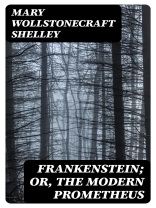In ‘Frankenstein; Or, The Modern Prometheus, ‘ Mary Wollstonecraft Shelley constructs a haunting narrative that explores the complexities of creation, ambition, and the nature of humanity. Written in the early 19th century and emerging from the Romantic literary tradition, this seminal work intertwines Gothic elements with philosophical inquiry. Shelley’s eloquent prose, coupled with her innovative narrative structure featuring multiple perspectives, invites readers into a world fraught with ethical dilemmas surrounding scientific advancement and the quest for knowledge, positioning Frankenstein as a critical precursor to modern dystopian literature. Mary Wollstonecraft Shelley, the daughter of renowned feminist Mary Wollstonecraft and political philosopher William Godwin, was influenced by her intellectual upbringing and the tumultuous era of the Industrial Revolution. Her personal experiences with loss and her reflections on the role of women in society shaped her understanding of creation and responsibility, which resonate deeply throughout the tale of Victor Frankenstein and his monstrous creation. This rich tapestry of personal and social context informs Shelley’s powerful critique of unchecked ambition and the consequences of alienation. ‘Frankenstein’ is essential reading for anyone interested in the intersections of literature, ethics, and science, as it remains strikingly relevant in contemporary discussions about artificial intelligence and bioethics. Shelley’s masterful storytelling not only captivates but also challenges readers to ponder their own moral responsibilities in an ever-evolving technological landscape.
लेखक के बारे में
Mary Wollstonecraft Shelley (1797–1851) occupies a prominent place in the literary canon as a pioneering figure in the genre of science fiction. Born into a rich intellectual heritage as the daughter of philosopher William Godwin and feminist thinker Mary Wollstonecraft, Shelley’s own contributions to literature challenged the boundaries of the romantic era’s imagination. ‘Frankenstein; Or, The Modern Prometheus’ (1818) stands as her most illustrious work, an enduring tale of creation and consequence that resonates with themes of ambition, humanity, and ethics. With its groundbreaking amalgamation of Gothic horror and scientific speculation, ‘Frankenstein’ effectively inaugurated a new genre that probes the dark interface between human society and the unknown. Shelley’s novel, composed during the storied ‘year without a summer’ of 1816, continues to influence literary and cultural landscapes, inspiring myriad adaptations and scholarly analyses. As an author, Shelley transcended the customary passive role ascribed to women of her time, crafting stories imbued with intellectual depth and moral inquiry. Her narrative style blends eloquent prose with a profound exploration of philosophical concepts, reflecting the educational privilege she enjoyed and her engagement with the thinkers of her day. Despite enduring personal tragedies, including the death of her husband, poet Percy Bysshe Shelley, Mary Shelley’s literary legacy endures, a testament to her intellectual vigor and imaginative foresight.












